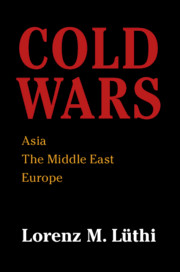Book contents
- Cold Wars
- Cold Wars
- Copyright page
- Dedication
- Contents
- Maps
- Acknowledgments
- Note on Names, Transliterations, and References
- Abbreviations
- Introduction
- 1 From High Imperialism to Cold War Division
- Part I Elusive Unities
- Part II Asia
- Introduction to Chapters 5 to 7
- 5 China
- 6 Vietnam
- 7 India
- Part III The Middle East
- Part IV Alternative World Visions
- Part V Europe between the Superpowers
- Part VI European Détente
- Part VII The End of the Regional Cold Wars
- Notes
- Index
Introduction to Chapters 5 to 7
from Part II - Asia
Published online by Cambridge University Press: 19 March 2020
- Cold Wars
- Cold Wars
- Copyright page
- Dedication
- Contents
- Maps
- Acknowledgments
- Note on Names, Transliterations, and References
- Abbreviations
- Introduction
- 1 From High Imperialism to Cold War Division
- Part I Elusive Unities
- Part II Asia
- Introduction to Chapters 5 to 7
- 5 China
- 6 Vietnam
- 7 India
- Part III The Middle East
- Part IV Alternative World Visions
- Part V Europe between the Superpowers
- Part VI European Détente
- Part VII The End of the Regional Cold Wars
- Notes
- Index
Summary
Over several decades, three countries played major roles in Asia’s Cold War. China, Vietnam, and India all were dynamic agents in the shaping of their own fates, and definitely not just passive battlegrounds in the global competition between the United States and the Soviet Union. Their decolonization occurred in parallel to that of the Middle Eastern countries (Chapter 2), but was intertwined with the Cold War in more profound ways. As early as 1927, China became a major regional theater of the ideological conflict that would be typical for the Cold War, when Chiang Kai-shek’s Guomindang (Nationalist Party) turned on the Soviet-sponsored Chinese Communist Party and started an intermittent civil war that lasted for over two decades.1 During a pause in this conflict in the period of 1937–45, China fortuitously got rid of formal colonial interference as Japanese occupation terminated the Western presence, and Washington’s defeat of Tokyo in 1945 ended Japanese imperialism. In early 1946, the civil war resumed in the form of a local Cold War, ending with Chinese communist victory three years later.
- Type
- Chapter
- Information
- Cold WarsAsia, the Middle East, Europe, pp. 115 - 116Publisher: Cambridge University PressPrint publication year: 2020

